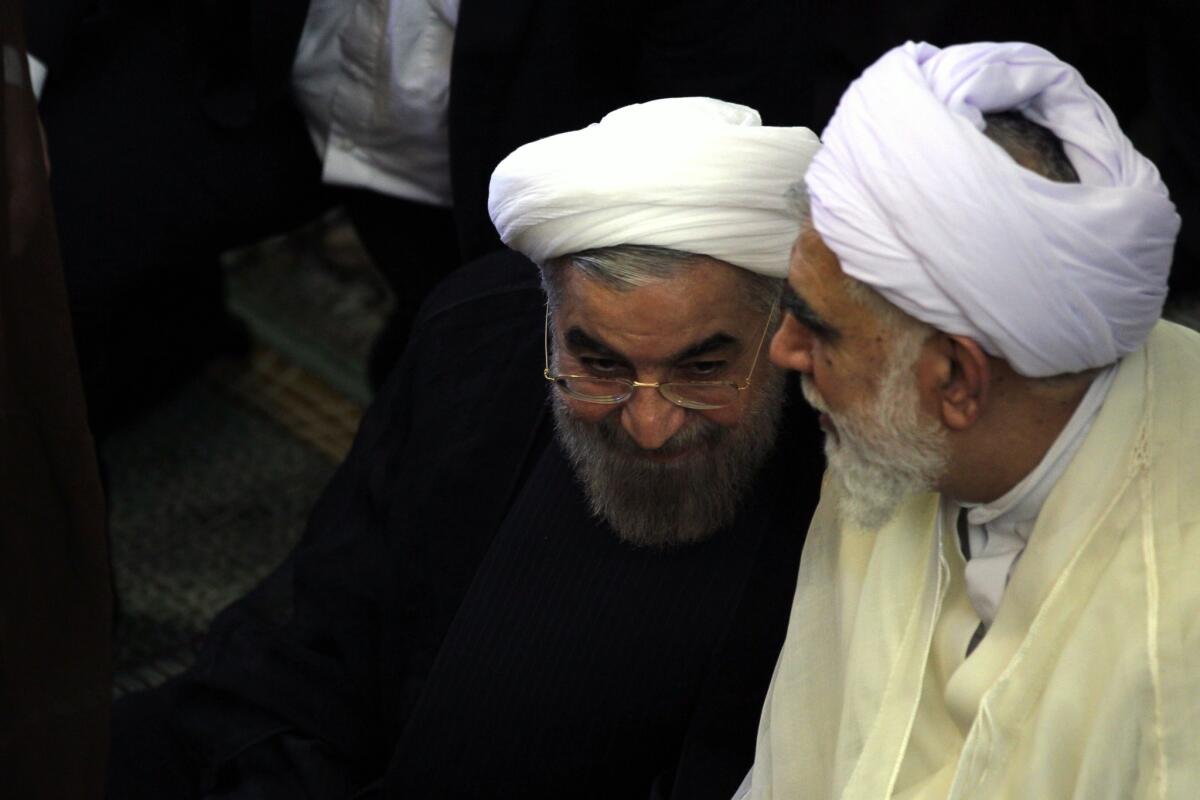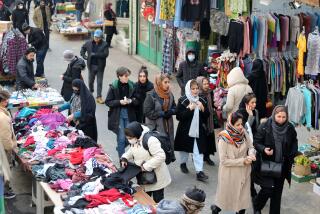Iran president-elect hints at need for nuclear sanctions relief

- Share via
Iranian President-elect Hassan Rouhani has accused his soon-to-be predecessor, Mahmoud Ahmadinejad, of provoking fights within the leadership and driving the economy into crisis, signaling that he will focus on the country’s domestic troubles when he takes office on Aug. 4.
Rouhani will have little direct influence on Iran’s foreign policy or security matters, such as the disputed nuclear program that Western governments suspect is aimed at gaining atomic weapons capabilities. Those matters remain under the control of the country’s supreme leader, Ayatollah Ali Khamenei.
But by following through on his campaign pledge to do battle against rising inflation and unemployment, Rouhani may be preparing Iranians for the concessions the religious hierarchy would have to make on the nuclear programs to get international sanctions eased and eventually lifted.
The moderate cleric who was Iran’s chief nuclear negotiator before Ahmadinejad came to power spoke during the election run-up of the need to be more “transparent” with the outside world, hinting that international inspectors barred from Iranian facilities in recent years might be allowed to visit suspect facilities.
In punishment of Tehran’s barring of U.N. nuclear experts for most of the last five years, the United States and the United Nations have imposed severe sanctions that limit Iranian overseas oil sales and bar transactions dominated by the rial, Iran’s currency, through Western banks.
The punitive measures have cut the value of the Iranian currency by two-thirds, although the battered rial has experienced a slight bounce since Rouhani’s surprise first-round election win on June 14. Annual inflation, variously estimated between 30% and 40%, has cut deeply into the average household’s buying power and given rise to widespread shortages of imported food and consumer goods.
Rouhani, as a candidate, promised to work cooperatively with lawmakers to pass a budget and an increase in the minimum wage.
In an address to lawmakers late Sunday, he blamed the decline in living conditions on mismanagement by Ahmadinejad’s government. He also accused the outgoing leader of provoking conflict between the government and parliament and misleading lawmakers about the full damage inflicted on the economy during his tenure.
“Solving the country’s problems will not be possible without cooperation between parliament and the executive branch,” Rouhani was quoted by the Mehr News Agency as telling the legislators.
He said some of the economic difficulties suffered in Iran are the result of “unjust foreign pressures” – meaning sanctions – but also “domestic performance” and disruptive bickering among political factions.
“The future government will not think of confrontation with parliament, nor will it think of, God forbid, fooling parliament with inaccurate statistics,” he said, alluding to a recent budget report submitted by Ahmadinejad in which the inflation rate was grossly understated.
Rouhani was likely attempting to mend fences with lawmakers after the acrimonious relationship they had with Ahmadinejad. The new president will need parliamentary approval of his nominations for Cabinet, which he vowed during the campaign would be capable technocrats, departing from his predecessor’s habit of filling senior government posts with relatives and political allies.
ALSO:
U.S. envoy meets with Egypt’s interim leader
Israel in middle of legal tussle between U.S. and China
Bangladesh sentences former Islamist party leader for war crimes
.
More to Read
Sign up for Essential California
The most important California stories and recommendations in your inbox every morning.
You may occasionally receive promotional content from the Los Angeles Times.











